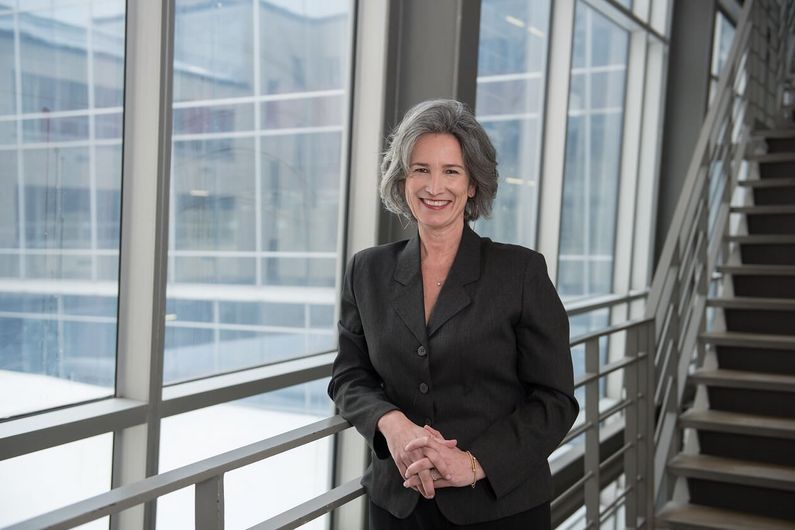Community partnerships: UdeM is open to the community and part of the community
- UdeMNouvelles
10/24/2022
- Béatrice St-Cyr-Leroux
Vice-Rector Valérie Amiraux discusses the University's commitment to community partnerships and invites organizations to build new relationships with UdeM.
In June 2020, Rector Daniel Jutras created the Office of the Vice-Rector of Community and International Partnerships (known by its French acronym VRCIP) in line with his commitment to promoting community engagement initiatives. The VRCIP’S mandate is to be attentive and responsive to the needs of groups in the community.
For over two years, the VRCIP has been allocating material, intellectual, human and financial resources to partnerships with local and international organizations.
Professor Valérie Amiraux, the head of the VRCIP, discussed the importance of this aspect of UdeM’s role and her desire to reach out to organizations interested in collaborating with her team.
What is the purpose of the Office of the Vice-Rector of Community and International Partnerships?
Our goal is to make the University accessible to everyone—to communities and also to community organizations. We want to raise our profile with them. We want to help break down the walls between academe and the community, to make the University a livelier place, an institution that is more responsive to the needs of community partners. The VRCIP wants UdeM to be perceived as an institution that listens, that you can talk to, that you can go to with your needs.
We started with nearby neighbourhoods—Côte-des-Neiges, Outremont, Parc Extension—but we want to extend our services to the entire Island of Montreal, to the four corners of Quebec, and internationally as well.
Why do you want to make the University of Montreal accessible to all?
The University’s mission is education and research, to be sure, but we often forget that it also has a community service mission. UdeM is a public entity funded by a government ministry and it must serve the public, within the limits of available resources.
This translates into supporting community organizations with project development, making our experts available, helping with specific needs, assisting with funding applications, etc. These are all ways we can help them pursue their missions.
And our services extend beyond local initiatives; we also collaborate with a number of organizations internationally. One example is the TUMAINI project recently launched with 2018 Nobel Peace Prize winner Dr. Denis Mukwege in the Democratic Republic of the Congo.
Aside from this major project, can you give us other examples of partnerships between UdeM and community organizations, at home and abroad?
In collaboration with Audace au Féminin, we hosted women entrepreneurs from Senegal for networking activities to help develop their projects. They were connected with the Millénium Québecor program, the Centre d’entrepreneuriat de l’Université de Montréal, and faculty members working on topics of interest. In early 2023, we will organize another similar event, this time geared towards Indigenous female entrepreneurs.
Another concrete example is the L’extension health and educational support centre located in the heart of the Parc Extension neighbourhood. Its main objective is to support the development of children in need and assist their families by offering access to educational services and health care.
Since 2021, the VRCIP has been organizing summer school sessions and day camps in collaboration with the University’s faculties, departments and CEPSUM. The goal is to provide our community and surrounding neighbourhoods with new and accessible experiences on our campuses by leveraging the school’s resources.
We are also talking to Clinique mauve, a clinic designed specifically to meet the needs of racialized and immigrant members of the LGBTQI+ community. Our School of Social Work and School of Public Health will take part in the project.
So would you say the University is a multidisciplinary and multifaceted partner?
Our 13 faculties and schools cover a wide range of fields of knowledge, from music and natural sciences to law, humanities and health; this makes us a potential partner on many, many fronts. We hope that people think of us as a partner that can provide them with wide-ranging resources and expertise.
Community organizations were hit particularly hard during the pandemic, mainly due to lack of funding. Can UdeM also help organizations financially?
As a public institution, the University of Montreal can be a political player, along with other actors in the public sphere, on a variety of issues. We can also be cosponsors of funding applications. Additionally, we can help organizations consider how to seek philanthropic support.
When we send interns to train in the environment in which they want to work in the future, we want to make sure they won’t be a financial burden on these community organizations. We give careful consideration to the financial implications when we set up internships.
Let's keep in mind, however, that this isn’t charity; we choose projects that we believe will promote the common good, that will support our society’s advancement and development.
Interested in partnering with the University of Montreal?
Valérie Amiraux and the VRCIP team will be happy to listen to your needs and assess the potential for a partnership, based on the University’s available resources.
Please contact them at vrpci@umontreal.ca












